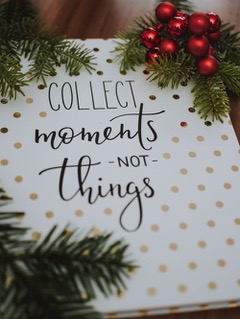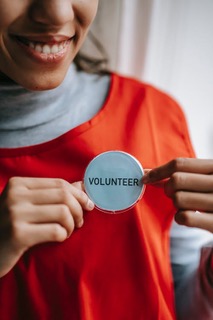Stephanie Voth, MSW RSW
The holiday season is upon us and with it can bring feelings of sadness, grief, and loneliness. At the same time, the holiday season can also be a meaningful and significant time of year when we acknowledge and express gratitude for what we have and the people in our communities who have made a positive impact on our lives. Holiday themed music and movies tend to highlight the joy of this season and provide reminders to cherish those we care about and the time spent engaging in pleasant activities or special traditions.

What is it about this time of year that creates joy, comfort, and value? Although we may want this season to last all year long, we can’t hold onto the desired emotions forever, and yet there are ways to access and experience them during the holidays as well as throughout the year. It’s common to try avoiding difficult emotions or situations with pleasurable activities, such as holiday shopping or self-indulgent spending, but often the happiness experienced is very short term, unsustainable and doesn’t actually lead to long-term fulfillment. There may be a different approach when seeking joy and a long-term purpose this holiday season and into the new year. My encouragement is to resist and act opposite to the capitalistic messages which aim to convince us that if we just buy more stuff we’ll achieve happiness.
In DBT, distress tolerance and emotion regulation skills include making meaningful contributions and accumulating positive experiences. Contributing is doing something kind for another person or participating in an act of service. Contributing can relieve emotional distress by helping focus your mind off a difficult problem or distressing situation for a period of time. Many people feel good about themselves when helping someone else.
There is also ample research and anecdotal evidence that shows the beneficial effects of volunteering on mental and physical health, life satisfaction, social well-being and depression (Yeung et al., 2017). Volunteering allows individuals to build a support system and develop leadership and other valuable skills that may contribute to future employment opportunities or meaningful life purpose (Hopper, 2020).
The following are a few suggestions of ways you can add positive experiences, activities, and emotions to your holiday season through contributing and giving to others.
- Giving through Donations
- Research local and global organizations in line with your values and support financially so they can continue their work throughout the year.
- Donate clothing or household items to a local thrift store or donation centre.
- Donate new items to shelters or other services that support children and adults in need of specific items.
- Giving through Volunteering

- Many non-profit organizations depend heavily on the generosity of volunteers, especially during the holiday season. Contact a community agency or service you’re interested to partner with and inquire if there are volunteer opportunities, even if it’s a one-time volunteer shift. You never know when a one-time volunteer position can turn into a long-term committed partnership and the impact of your gift in helping someone else.
- Do a Google search for ‘Holiday Donations’ or ‘Donate Toronto’ to view a list of opportunities to give physical items like food or clothing, financial gifts, or volunteer your time and services.
- Giving through Hospitality
- Be mindful of what the people around you need most this season. A friend may enjoy tea or a local coffee shop, so tea or a bag of their favourite fresh ground coffee may be an obvious choice for a gift. You might overhear a co-worker’s comments about feeling stressed or not having time to cook dinner for their family with their commute to and from work, so you might explore a gift that meets the specific need for a break (perhaps by offering to cover part of their work responsibilities one day or bringing/buying them a meal).

- If we’re not intentional, it’s without knowing our neighbours. The holidays can provide a great excuse to meet your neighbours by dropping off baked goods, a plant, kind note, or other house warming type gift. Even shoveling snow is a kind act of service your neighbour will appreciate.
There are endless options for actions that contribute to another’s well-being. Be curious for yourself and experiment with gratitude and contributing through giving, volunteering and hospitality. Giving can be fun, creative and life changing.
Where and how can you be a gift to someone else this holiday season? No amount of generosity is too small and may have a lasting impact on the recipient and you.
References
Grabowska, K. (2021). Pexels [online photo]. https://www.pexels.com/photo/cold-snow-man-people-6952439/
Hopper, E. (2020). How volunteering can help your mental health. Greater Good Magazine. https://greatergood.berkeley.edu/article/item/how_volunteering_can_help_your_mental_health
Lilartsy. (2018). Collect Moments Not Things Quote [online photo]. Pexels. https://www.pexels.com/photo/collect-moments-not-things-quote-1721092/
Summer, L. (2020). Pexels [online photo]. https://www.pexels.com/photo/smiling-ethnic-woman-showing-volunteer-sign-on-red-apron-6348129/
White, B. (2016). Christmastime Traditions [online photo]. Unsplash. https://unsplash.com/photos/dddQHervE04
Yeung, J., Zhang, Z., & Kim, T. Y. (2017). Volunteering and health benefits in general adults: cumulative effects and forms. BMC public health, 18(1), 8. https://doi.org/10.1186/s12889-017-4561-8